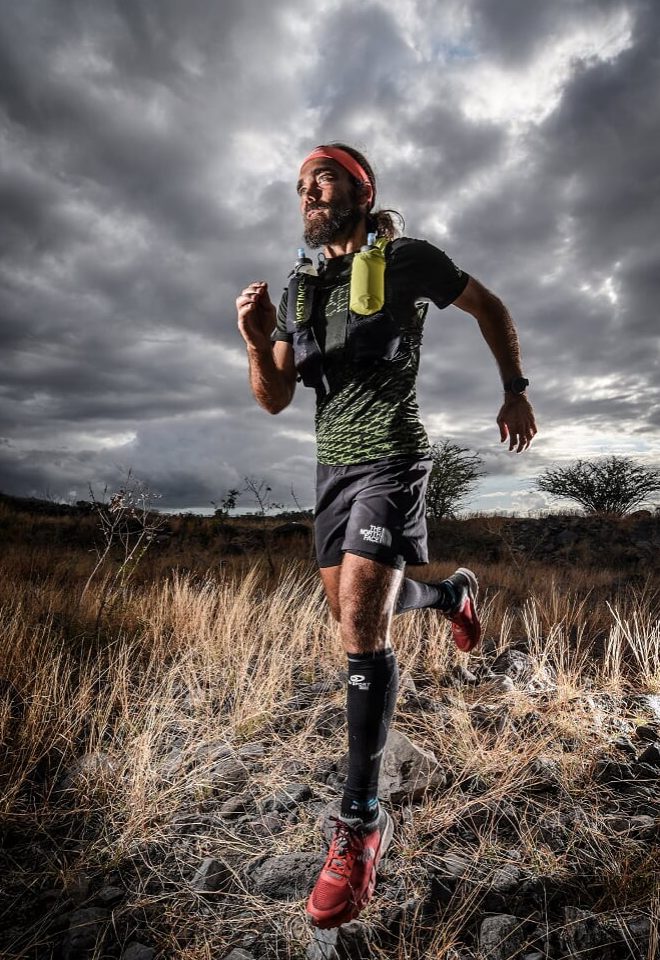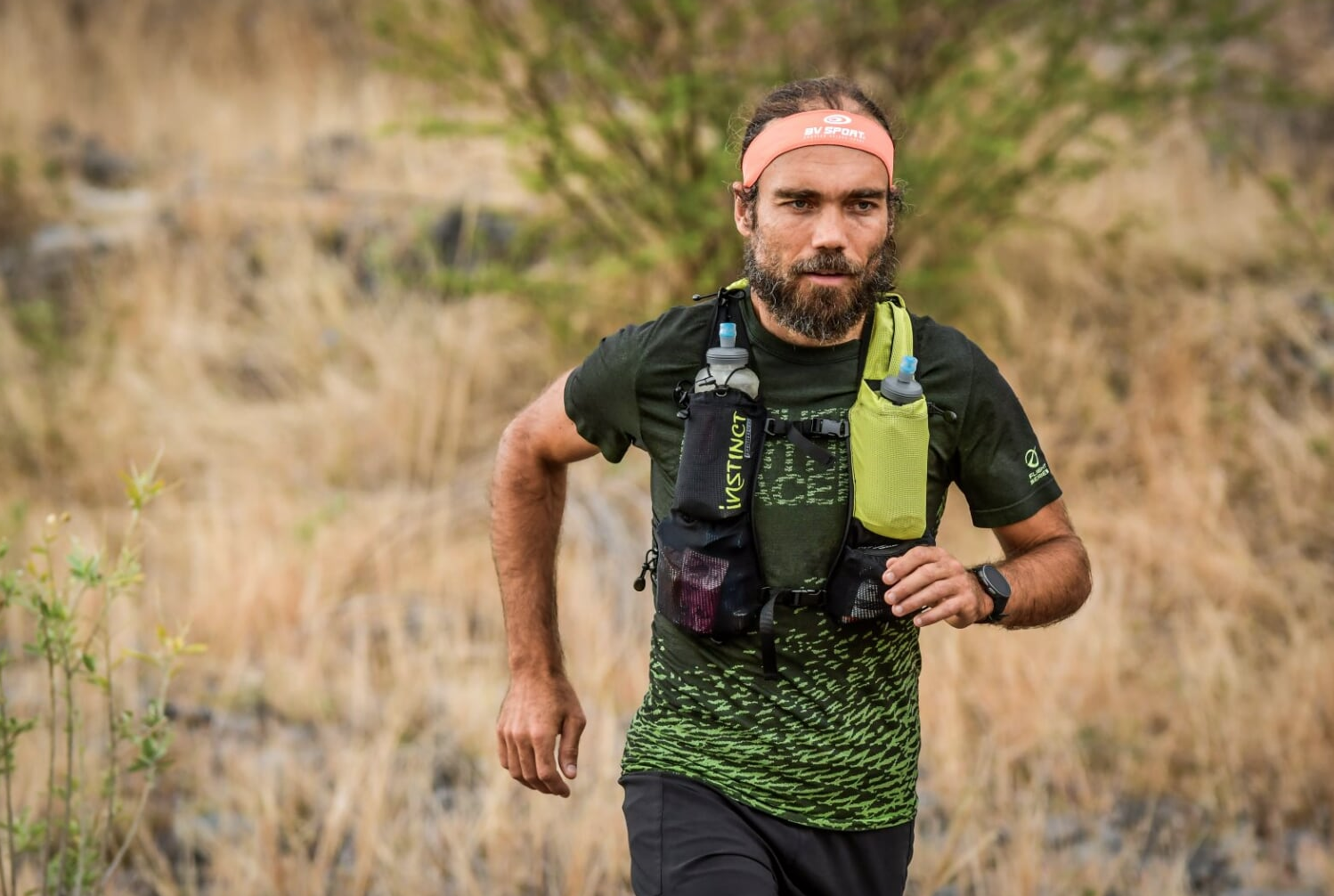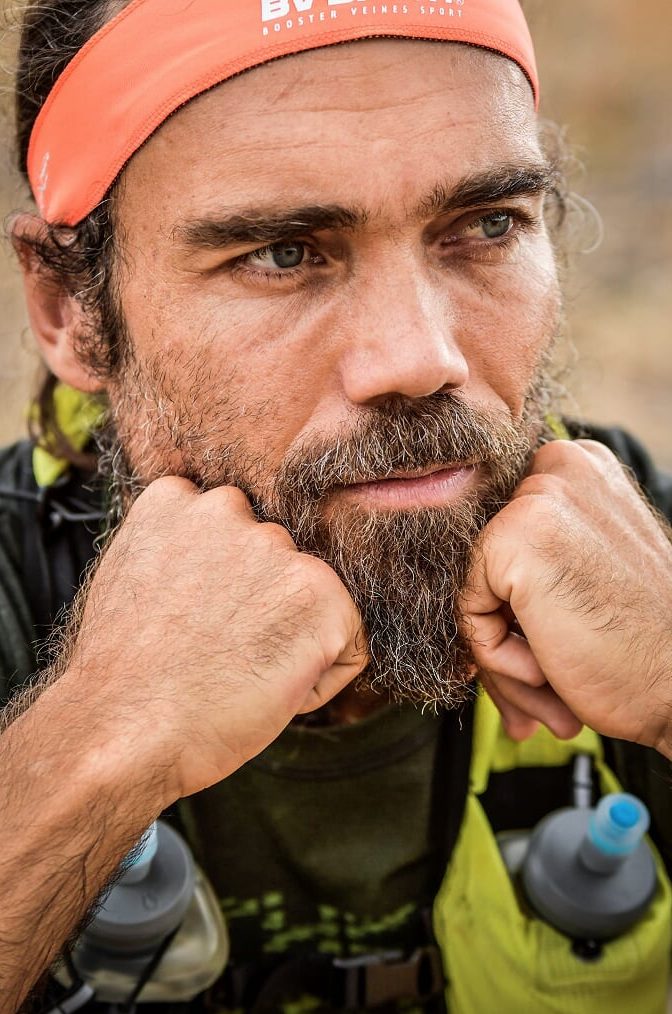Ultrarunning has been a part of Florent Bouguin‘s life for a long time. He ran his first ultra at 17, and now, almost 30 years later, he’s still in love with the sport. A lot has changed since his first race. He moved from Réunion—a small French island in the Indian Ocean—to Quebec, got married and started a family. And today, ultrarunning is about much more to him than just winning races, even though he’s had plenty of success, routinely performing well in ultramarathons (most recently, he came third at the Mesquite Canyon 50 miler in Arizona in March) and acting as an ambassador for The North Face. His main focus is not race results or fast times, however. He’s driven by three personal values—authenticity, sharing and resilience—and they all point to his ultimate goal of sustainability. He wants to be able to run for the rest of his life.

Authenticity
Bouguin says being authentic is so important for runners. Without authenticity, when life gets busy, your training will become a chore—not something you necessarily want to do, but rather something you just want to get out of the way.
RELATED: How ultra-trail runners fit training into a busy life
“You have to put energy into your running during bad times,” he says. “If you don’t find your real motivation and you’re not honest with yourself, you will never succeed. You’ll give up, you’ll find good reasons to quit.” With authenticity, it’s completely individualized. Bouguin’s authentic self is different from any other runner’s, and his internal drive to run is different, too.
“Each person finds their own motivation. I always ask myself, ‘Why am I running?'” This isn’t a hypothetical question to him. Some people might think he’s running to win races or for sponsorships, or perhaps to make sure everyone in the ultrarunning community knows the name Florent Bouguin. None of those motivate him, though, and he doesn’t concern himself much with what other people think.

RELATED: Ultras produce the most obsessive runners
“When I find the answer, it should be 100 per cent honest,” he says. “Honest for myself, not for anyone else. I’m running to be a better man, a better father, a better worker, someone who is pushing the limits.” Bouguin runs for the right reasons: his own. No external pressures, just for himself. It’s for this reason that he feels connected to The North Face, a company for which he’s run for eight years.
“I like their slogan: ‘Never stop exploring,'” he says. “For me, I never stop exploring what my body and mind are capable of.” Bouguin says he knows that The North Face of course values the success of their athletes—they want people who can win races—but he feels that they care about much more than where he lands on a race results list.
“It’s not to be the best,” he says, “but to never stop exploring. When I do that, I feel honest and authentic.”
RELATED: How ultrarunning could make you a faster marathoner
Sharing
His next value is sharing, and although it’s a simple concept to grasp, it is still very important to Bouguin, and one which aligns well with authenticity.
“People feel running is an individual pursuit, but when you go deeper into running, it is a collective sport,” he says. To find balance in running and life, we need to share. “I would never be able to do what I’ve done if I was alone. If I didn’t tell people what my goals were, I would never reach them.” The first step is to find your authentic self and the reasons you’re running, but next you must share those motivations with others.

RELATED: Why do we run? Strava found out
“I’ve been approached by other brands,” he says. “What I like with The North Face is their real motivation to have me in the team. Of course they want athletes who are performing well, getting podiums and winning races, but it’s not what they want first. They want someone who is an ambassador—someone who, when people see them, they know they’re approachable.” At races, Bouguin always endeavours to take time with anyone who comes to chat with him, and to share their experiences from the event and past runs.
Resilience
Resilience is, of course, important for all runners, whether they run 5Ks or ultramarathons. It’s necessary to be resilient in both training and racing, because without pushing through workouts, success in races will never come.
“When you train early in the morning and you see your kids and your wife sleeping, it’s hard,” Bouguin says. “Sometimes I’m training and thinking of my kids and how I want to be with them.” In racing, too, it can be tempting to give up at times, but pushing through those moments of doubt can lead to major successes and accomplishments.
RELATED: S’entraîner pour un ultramarathon en temps de COVID-19
Once again, Bouguin’s first value of authenticity ties back in. If you’re authentic, true to yourself and running for the right reasons, it will be so much easier to power through those tough times when you want to quit. You’ll continue to train and you’ll keep racing, because your authenticity will breed resilience within you.
“Resilience is something an ultrarunner needs, because it’s something that you develop to be sustainable,” Bouguin says. In the end, that’s what each of his values lead to: sustainability.
“In my career, I’ve seen so many amazing athletes disappear after a few years. These guys ran amazing times and races, but for me, it’s not about racing the Western States 100 in under 15 hours, for example. I hope to be able to run in 10, 15, 20 years.”
RELATED: 10 tricks to stay motivated
Bouguin says racing purely for fast times and great results, for him at least, won’t lead to a long career in running. If he runs for his authentic reasons, however, he will continue to share his experiences with others (his family, friends and fellow runners) and he will want to be resilient in training and racing—he’ll still want to run 20 years from now.
Proud to finish
At every race, there’s only one official winner. It’s nice to be the first person across the finish line, and Bouguin has been in that position, but that isn’t why he runs. He runs for himself, and he doesn’t focus on times or rankings.
“I think we need to be proud to arrive at the finish line,” he says. “I’ve seen people run amazing races, but at the end, they don’t appreciate it because they didn’t make the podium. I’m racing to finish, not to win. When I cross the finish line, I think, ‘Wow, Florent, you just ran 100 miles.'” He hopes to inspire more people to think like this.
He says he knows that anyone can complete an ultramarathon, as long as they prepare properly, but he worries that people will hear his story and think, “That’s amazing, but I could never do anything like that.” Sure, not everyone can win a 100-mile race, but Bouguin says that shouldn’t be the driving force to run. He hopes to inspire people to ask themselves, “Why am I running?” and that when they do, they find an answer that is unique and authentic to them. That’s when the real fun starts.
